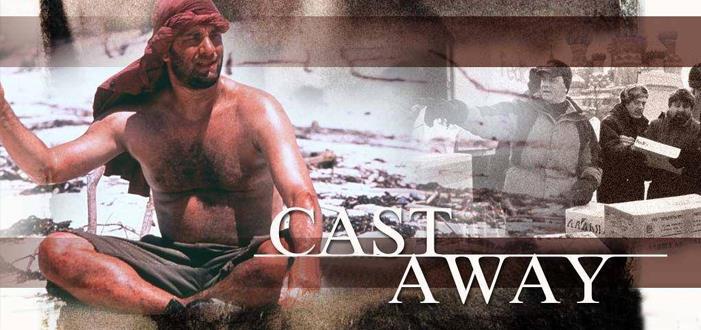
Castaway
Oh how much do we take for granted. I’m talking about civilization of course. Being thrusted into such plush surroundings makes us forget of the eons long perpetual investments man has made in bettering his habitat. This is all in an effort to at the least protect himself from the wildness of nature as it was only a smidgeon of recent time that he rationalized that it is best for his protection to control the direction of nature herself. Such a thirst is not one of self-serving power lust by necessity, as clearly, is it wrong for mankind to want to synthetically produce insulin so his babies with incorrect immune systems can avoid death? Is it wrong that he violate the soil and its original disposition, to excavate black gold to feed and sustain his higher motions? It is inherently Christian to fear man amplifying his dictation to nature and how she should be, versus celebrating it as expanding his able to be.
No, Castaway does not dive that far into meditation, as there is no pontification of the luxury we live in and yet constantly complain about – a good thing to be sure, for this restlessness contra Schopenhauer is what makes life worth living. But it does show how delicate and fragile all of this is. It reveals hidden to our hustle and bustle how precious all these thousands of years of human effort are. That at day’s end we are a shipwreck away from being exposed to the harshness of the wild. There is a bit of Hollywood magic, however, in how convenient it is that the island our castaway is set upon has a replenishing supply of coconuts. And his failures are not signaled strong enough for us to generate an intense empathy for his struggle. We are not even allowed to see his painful awareness that he may be sentenced the rest of his life to an island prison. What universals, in other words, what might be say the castaway expresses? We don’t see desperation, exhaustion, anguish. If any appear, such as in his failings to develop fire, they do not linger agonizingly enough to grant us gratitude to our forefathers for our own situations, no matter how wretched. Resentment is a symptom of entitlement, which is a disease of the ingrate.
Even the castaway’s longing for his love, which we find is what sustained him as long as possible, is merely castaway in itself. There are no scenes that express his yearning, his emptiness, for love, and again there is nothing to show for how he handles the brute fact.
Upon his return, we are given the sense of shell-shock, but nothing which makes concerted the juxtaposition for how barren he was to know how rich he is for being served ice cubes. I am not saying that this is what the thesis of the film is and that it missed, but I am saying that such a vision for gratitude is better intended cinema than the incoherent handling of the man’s lost love and his redemption at life.
Grade: B-

